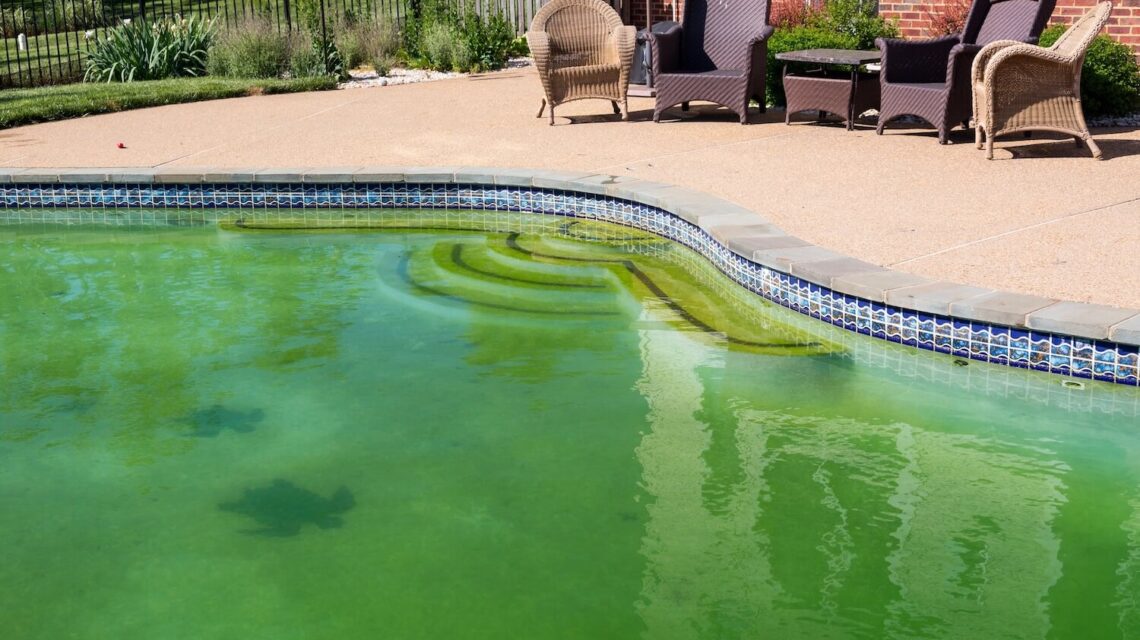A sparkling, inviting pool is the centerpiece of many outdoor spaces, providing a refreshing oasis during hot summer days. However, nothing puts a damper on pool enjoyment quite like discovering that your once crystal-clear water has turned an unsightly shade of green. This phenomenon, often referred to as “green pool syndrome,” can be caused by a variety of factors ranging from poor maintenance practices to environmental conditions.
In this article, we’ll explore the causes of green pool water and provide actionable steps to remedy the situation and restore your pool to its former glory.
Understanding the Causes of Green Pool Water
Before diving into solutions, it’s important to understand why pool water turns green in the first place. Green pool water is typically the result of algae growth, which can occur when the balance of chemicals in the water is disrupted or when conditions favor algae proliferation. Here are some common causes:
- Imbalanced Chemical Levels: Proper pool maintenance requires careful monitoring and adjustment of chemical levels, including chlorine, pH, alkalinity, and sanitizer levels. When these levels are not within the recommended ranges, it creates an environment conducive to algae growth.
- Poor Circulation and Filtration: Inadequate circulation and filtration allow algae spores to settle and proliferate in the water. This can occur if the pool pump and filter are not running efficiently or if there are obstructions that impede water flow.
- Environmental Factors: Environmental factors such as sunlight, temperature, and organic debris can also contribute to algae growth. Warm, sunny conditions coupled with organic matter like leaves, pollen, or grass clippings provide nutrients for algae to thrive.
- Neglected Maintenance: Neglecting regular pool maintenance tasks such as skimming, vacuuming, and brushing can lead to the accumulation of organic debris and bacteria, further exacerbating algae growth.
Remedying the Green Water Situation
Now that we understand the underlying causes of green pool water, let’s discuss how to address the issue and restore your pool to its pristine condition:
Test and Balance Chemical Levels
The first step in treating green pool water is to test the chemical levels and adjust them as needed. Use a reliable pool water testing kit to measure the chlorine, pH, alkalinity, and sanitizer levels. Ideally, chlorine levels should be between 1-3 parts per million (ppm), pH should be between 7.2-7.6, and alkalinity should be between 80-120 ppm. If any of these levels are out of balance, use appropriate pool chemicals to make adjustments.
Shock the Pool
Once chemical levels are balanced, shock the pool with a high dose of chlorine to kill existing algae and bacteria. Follow the manufacturer’s instructions for the appropriate dosage based on your pool size and severity of algae infestation. It’s important to note that shocking the pool may temporarily cloud the water, but this should clear up as the treatment takes effect.
Brush and Vacuum
After shocking the pool, use a pool brush to scrub the walls and floor to dislodge any algae clinging to surfaces. Follow up by vacuuming the pool to remove the loosened algae and debris. Be thorough in your cleaning efforts, paying special attention to corners, steps, and other areas where algae tends to accumulate.
Maintain Proper Circulation and Filtration
Ensure that your pool pump and filter are running efficiently to promote proper circulation and filtration. Clean or backwash the filter as needed to remove any trapped debris and improve water clarity. Additionally, consider running the pump for longer periods or investing in a variable-speed pump to enhance circulation and minimize algae growth.
Remove Organic Debris
Regularly skim the surface of the pool to remove leaves, insects, and other organic debris that can contribute to algae growth. Use a pool skimmer or net to scoop out floating debris before it has a chance to sink to the bottom and decompose.
Monitor and Maintain
Once your pool water is clear and algae-free, it’s important to stay vigilant with ongoing maintenance to prevent future outbreaks. Test the water regularly, clean the filter, and remove debris to maintain proper chemical balance and water clarity. Consider using algaecide or other preventative treatments as needed to keep algae at bay.
Importance of Professional Pool Maintenance
While regular DIY maintenance can go a long way in keeping your pool clean and healthy, there are times when professional assistance is invaluable. Here are some reasons why investing in professional pool maintenance is important:
Expertise and Experience
Professional pool maintenance technicians have the knowledge and experience to properly assess and address any issues with your pool. They understand the intricacies of water chemistry, filtration systems, and equipment operation, allowing them to effectively diagnose problems and implement solutions.
Time and Convenience
Maintaining a pool can be time-consuming, requiring regular testing, cleaning, and maintenance tasks. By hiring a professional pool maintenance company, you can free up your time and enjoy peace of mind knowing that your pool is being cared for by trained professionals.
Preventative Maintenance
Professional pool technicians can identify potential issues before they escalate into major problems. By conducting regular inspections and maintenance tasks, they can help prevent costly repairs down the line, saving you time and money in the long run.
Equipment Maintenance and Repair
Pool equipment such as pumps, filters, and heaters require regular maintenance to ensure optimal performance and longevity. Professional pool maintenance technicians can perform routine inspections, cleaning, and repairs to keep your equipment running smoothly.
Compliance and Safety
Proper pool maintenance is essential for ensuring the safety of swimmers and compliance with health and safety regulations. Professional technicians are well-versed in safety protocols and can help ensure that your pool meets all necessary standards for water quality and sanitation.
How to Find the Right Pool Maintenance Company
Finding the right pool maintenance company to meet your needs requires careful consideration and research. Here are some tips to help you find a reputable and reliable pool maintenance company:
- Ask for Recommendations: Start by asking friends, family, or neighbors for recommendations. Personal referrals are often the most reliable way to find a trustworthy pool maintenance company with a proven track record of quality service.
- Check Credentials and Certifications: Look for pool maintenance companies that are licensed, bonded, and insured. Additionally, inquire about any certifications or affiliations with professional organizations such as the Association of Pool and Spa Professionals (APSP) or the National Swimming Pool Foundation (NSPF).
- Read Reviews and Testimonials: Take the time to read online reviews and testimonials from past clients. This can provide valuable insights into the level of service and customer satisfaction offered by the pool maintenance company.
- Inquire About Services Offered: Different pool maintenance companies may offer varying levels of service, so be sure to inquire about the specific services included in their maintenance packages. Ideally, you’ll want a company that offers comprehensive maintenance, cleaning, and repair services to meet all of your pool care needs.
- Request Estimates: Obtain quotes from multiple pool maintenance companies to compare pricing and services. Keep in mind that the cheapest option may not always be the best choice, so prioritize quality and reliability when making your decision.
- Schedule a Consultation: Once you’ve narrowed down your options, schedule a consultation with the pool maintenance company to discuss your needs and expectations. Use this opportunity to ask questions, address any concerns, and assess the professionalism and expertise of the company’s technicians.
Conclusion
Dealing with green pool water can be a frustrating experience, but with the right approach, it’s entirely manageable. By understanding the underlying causes of algae growth and taking proactive steps to address them, you can quickly restore your pool to its former beauty and enjoy crystal-clear water all season long. Remember to stay diligent with regular maintenance to prevent future outbreaks and keep your pool inviting and refreshing for years to come.




